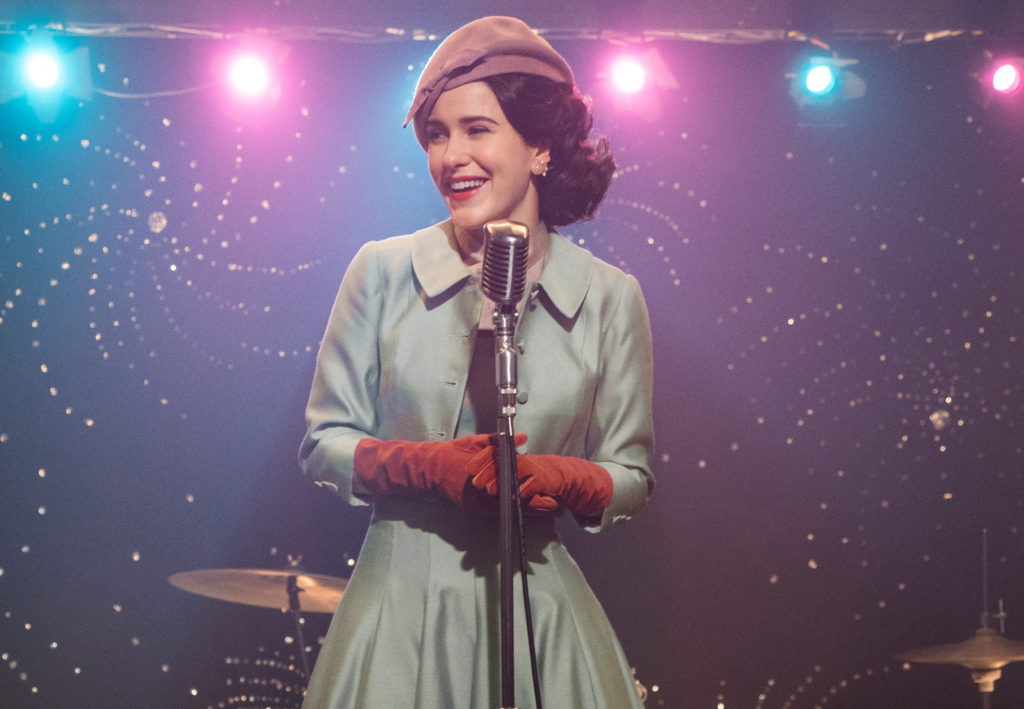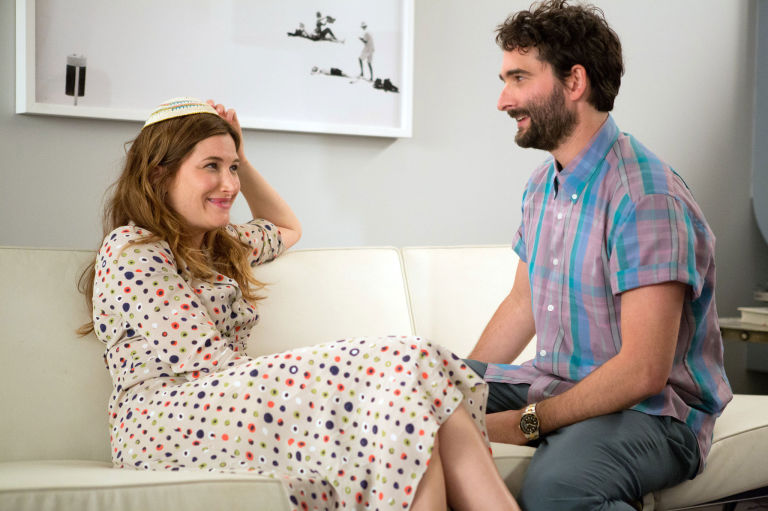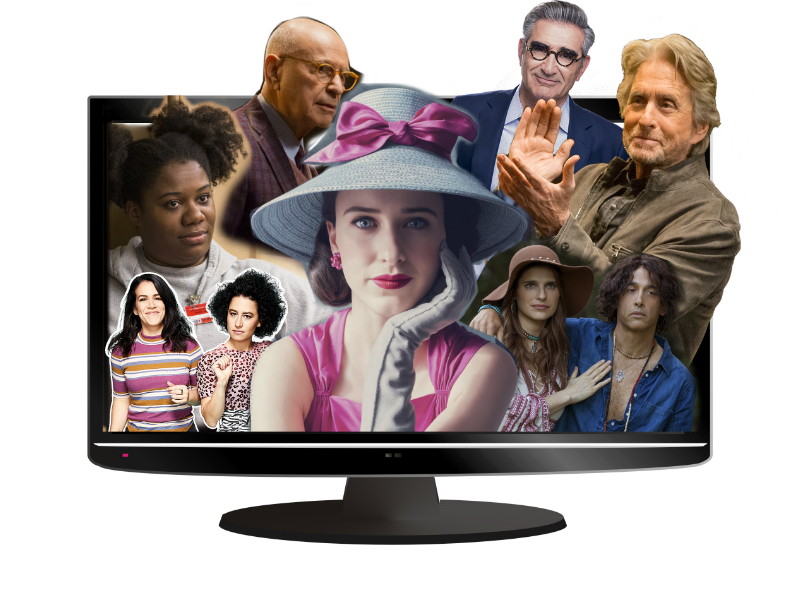If you kept up with critically-acclaimed TV comedies this past decade, you’d have noticed the hefty number of Jewish actors and showrunners behind some of the decade’s biggest hits. Look at the Golden Globe awards for best comedy show: four of the last seven awards have gone to shows created by Jews and starring openly Jewish characters (Girls, Transparent, The Marvelous Mrs. Maisel, The Kominsky Method), while all those shows’ lead actors – mostly Jews – themselves won Golden Globes.
Even beyond award season, the 2010s have been phenomenal for Jewish TV. Broad City! Crazy Ex-Girlfriend! Man Seeking Woman! Sarah Silverman said I Love You; Amy Schumer invited us Inside; Moshe Kasher was Problematic; Nathan Fielder was For You. Heck, even CBC-TV threw their weight behind local Jews Dan Levy and Catherine Reitman. For years, there was a veritable typhoon of Jewish comedy flooding TV screens across North America.
Today, not so much.

This year, three of the most Jewish shows of the past decade have already ended or will end their successful, award-winning runs: Broad City, Transparent and Crazy Ex-Girlfriend. Other seminal Jew-run shows, like Girls and Man Seeking Woman, which starred openly Jewish characters (played by openly Jewish actors), have already ended, their showrunners having since moved on to new projects that do not explicitly star Jewish characters. (Lena Dunham’s Camping and Simon Rich’s Miracle Workers, respectively.)
So it’s with sadness that I bid goodbye to the 2010s, a breakthrough decade for Jewish visibility on the small screen – a phenomenon I doubt will be repeated anytime soon. In the past decade, we’ve witnessed a once-in-a-generation medley of niche cultural hunger, revolutionized viewing habits, flattened industry hierarchies and rapid content creation from a range of production studios that didn’t even exist 15 years ago.
The result has been a kind of televised cultural embrace unthinkable before the Internet era, and Jews have benefited enormously. This is not a secret. Jill Soloway, the mind behind Transparent, told author and TV critic Joy Press, “I spent a whole career trying to hide Jewish women in shiksa characters.”
Amy Sherman-Palladino set her breakout hit Gilmore Girls in small-town Connecticut, but the show’s rapid-fire dialogue, passive-aggressive parents and sheer vocabulary (“Oy, with the poodles already!”) screams Jewish. Fittingly, Sherman-Palladino’s latest show is The Marvelous Mrs. Maisel, a show unrivalled in its Jewishness.
Mrs. Maisel is still on the air (thank ha-Shem), but it was a latecomer to the trend. For the purposes of this essay, what I’m calling the Golden Age of Jewish Television comprises narrative shows created by Jews and starring Jewish characters whose cultural background – crucially – plays a role in the series’ development.

While programs like Nathan For You or Inside Amy Schumer overlap with the Golden Age, they don’t count; showrunners Nathan Fielder and Amy Schumer might occasionally invoke their Judaism onscreen, but neither created a narrative where the characters’ Judaism influences the plot in some way. (One’s a mockumentary, the other is sketch comedy.)
Neither am I counting Soloway’s short-lived Amazon series I Love Dick, which is in no way Jewish despite Soloway’s own Judaism.
Notwithstanding those restrictions, Jewish shows have proliferated across North America. I’ve noticed two broad categories:
- Introspective millennial-driven shows starring self-absorbed urban Jews:
- Broad City
- Crazy Ex-Girlfriend
- Girls
- Man Seeking Woman
- Schitt’s Creek
- Workin’ Moms
- Ensemble pieces by older, established Jewish showrunners:
- Transparent
- Wet Hot American Summer
- The Kominsky Method
- The Marvelous Mrs. Maisel
- The Goldbergs
- Orange Is the New Black
I am not including Israeli shows on this list, even though Israeli TV is in vogue right now with shows like Fauda and Shtisel, because I’m dealing with how Jewish assimilation into North America is reflected onscreen. I’m also not discussing TV dramas, though that was an easier call to make since Jews have historically been pigeonholed into situational comedies anyway. And while the hallmark Jewish shows Curb Your Enthusiasm and Will & Grace were revived in the 2010s, neither is a product of the same cultural climate.

The harder call was whether to exclude traditional network-show Jews from this list – such as Max from ABC’s Happy Endings, Schmidt from Fox’s New Girl and Howard from CBS’s The Big Bang Theory.
I ultimately decided to omit them, because, to me, they feel more like throwbacks to token Jewish sitcom characters, like the Gellers in Friends, whose Judaism is incidental and superficial. The punchlines of these modern tokens harp on schlocky Yiddishisms and stereotypes. Howard’s Jewish mother is pure retrograde garbage. (Contrast that with Susie Essman’s Broad City matriarch: “I’m the person that showed you how to insert a diaphragm, so let’s just show a little respect!”)
As for New Girl, well, to quote Gabe Friedman writing in the JTA, the show is “full of Jewish jokes that aren’t very Jewy…. The sitcom, which centres on a group of friends in their early 30s who live together in a Los Angeles loft, does not have a Jewish tone or plot. There’s just Schmidt, who’s said to be Jewish – repeatedly.”
In defence of those shows’ writers, their work is shackled to major networks, warped to fit a generic mould where diversity is embraced, as long as you’re not too different. It’s an antiquated restriction. Even The Goldbergs, a long-running current network sitcom that is inescapably Jewish, is an outlier on this list; many of the gags feel broad, recalling how Everyone Loves Raymond, a show by a Jewish guy about an Italian family, was successfully adapted into Russian, Hebrew and Dutch. The Goldbergs themselves may be Jewish, but they’re universal by design.
READ: BIRDS OF DIFFERENT FEATHERS FLOCK TOGETHER
No, the shows I’m talking about – the Golden Age shows – air on alternative platforms and don’t hide behind stereotypes. Those shows bleed Judaism. Their characters feel profoundly Jewish without needing to rely on throat-clogging consonants or bar mitzvah jokes.
That was the real Golden Age, a decade upon which we can look back and sigh, asking ourselves, “How did it happen, anyway?”
***
It all began, ironically, on a major network. It began with Seinfeld.
Debuting in 1989, and running for nine seasons, the show redefined what sitcoms could and would be. Never before had a show cinematically blended single and multi-camera angles, or abandoned sentimentality so absolutely in the name of laughter. Never before had a show embraced dark, weird, absurd storylines that brought surrealism to the small screen.
In the subsequent decade, many networks would copy the Seinfeld formula. Jerry Seinfeld recently told The Hollywood Reporter that, when Friends came out, he remembers thinking, “They wanna do our show with better-looking people.”

It wasn’t just Friends. In Something Ain’t Kosher Here: The Rise of the “Jewish” Sitcom, author Vincent Brook charts the rise of Jewish sitcom characters from 1948 to 2002: There’s another show called The Goldbergs (no relation; based on an longstanding radio show) in the late 1940s and early ’50s, nothing in the ’60s, a handful of series into the ’80s. Then 1990 hits, and 30 shows flood the airwaves, including Mad About You, Will & Grace, Clueless and The Nanny.
Brook chalks this up to the copycat effect, where producers raced to follow the success of Seinfeld. That meant, at least in part, bringing Jews onscreen. But the Jews didn’t feel authentic.
“You’ll notice the word ‘Jewish’ in my book is in quotes,” Brook told me in an interview. “Yes, there was more of a green light to be Jewish, but there was still a residual resistance to being ‘too Jewish.’”
The result, he says, is a show like Friends, which copies a lot from Seinfeld – from specific episode plots to Jewish inclusion – but downplays Judaism considerably.
Even so, the fact that Seinfeld’s childhood friend George Costanza is Italian, despite being a small-screen Woody Allen replica based on the show’s co-creator Larry David, and even being played by the Jewish Jason Alexander, is further evidence that even NBC executives weren’t comfortable showcasing too many Jews in one show.

And yet, there was still something obviously Jewish about Seinfeld, not to mention the newfound Jewish visibility across virtually every other hit sitcom of the 1990s. It would be influential to a generation of millennials who caught Seinfeld reruns every evening.
“The shove?” asked Ilana Glazer onstage in November 2018, during a ceremony commemorating the Jewish actress Julia Louis-Dreyfus, who played Elaine on Seinfeld. “The shove changed my life.” Glazer was talking about Elaine’s propensity to shove George and Jerry around in virtually every episode: literally, a woman making space for herself in a man’s world.
Glazer co-created Broad City, one of the earliest breakthrough millennial comedies unabashed in its Judaism. In an NPR interview from 2015, she and co-creator Abbi Jacobson specifically cite Larry David, who also created Curb Your Enthusiasm, as the biggest influence on their show.

Zoom out and you’ll notice a trend among popular Jewish millennial showrunners. Jacobson and Glazer play exaggerated versions of themselves onscreen, also named Abbi and Ilana. Dan Levy, in Schitt’s Creek, plays the son of Eugene Levy, his real-life father. In Crazy Ex-Girlfriend, showrunner Rachel Bloom, who rose to fame singing Disney parodies on YouTube, plays a woman named Rebecca Bunch who’s obsessed with musicals.
You can’t fault these showrunners, under or around 30 years old, for writing what they know. The by-product of their self-analyzing sitcoms has been a shameless expression and exploration of what it means to be a Jewish millennial, assimilated into but still distinct from mainstream North American culture. None of these characters hide their Judaism onscreen. Virtually all embrace it.
Zoom out further and you’ll see this is not unique to Jewish millennials. Sitcom tokenism is being phased out by a newfound craving for authentic human stories from new perspectives. It’s cool to be different. Shows like Jane the Virgin, Fresh Off the Boat and Black-ish are blending minority memoir with social commentary, absurdism and observational humour in unprecedented ways. Jewish stories are simply one part of that larger multicultural pie.
And because cultural uniqueness is in vogue, that has opened the floodgates for older showrunners to likewise explore their heritage. Jill Soloway’s comment about hiding her shiksa characters speaks precisely to that. She has also referenced the old Hollywood phrase, “Write Yiddish, cast British,” and how she deliberately wanted to break that with Transparent, which follows a Jewish family through the patriarch’s transgender transition. In the show’s fourth season, they travel to Israel and the West Bank for a half-season arc, digging deep into their conflicting moral stances on the issue.
It’s not a story that could get airtime on a major network. Transparent is an Amazon original, one of two super-Jewish shows on that streaming service by middle-aged female industry veterans. (Mrs. Maisel is the second.) That Jews have proliferated in the era of streaming speaks to the second fundamental reason the 2010s were such a breakthrough decade for televised Jews: it was also a breakthrough decade for streaming services.

Streaming platforms such as Netflix and Amazon have fragmented the TV industry, inviting creators to find niche audiences, as opposed to the necessarily broad mainstream style of the 20th century. When television is no longer aimed toward literally everyone, creators don’t have to pander to the masses.
To follow Vincent Brook’s narrative, modern Jewish creators of all ages are building upon the groundwork laid in the 1990s. “That kind of self-criticism that Jews are known for, that is more permissible in the streaming era,” Brook says. “I don’t think it can be overestimated how critical that shift is.”
That brings us to 2019. After the initial gold rush, the era is slowing down. Virtually all those great Jewish shows have ended, with only a handful remaining. The showrunners will keep working, of course, but will their next projects be as Jewish?
I doubt it. Writers tend to expand their horizons. I expect most will have gotten their “Jewish” stories out of their system, and will follow Jenji Kohan’s trajectory: after she made Weeds, which was quite Jewish, she made Orange Is the New Black, which was somewhat Jewish, and most recently oversaw GLOW, which is barely Jewish.
If there will ever be another Golden Age of Jewish Television, we might have to wait another 15 or 20 years. By then, the writers and stars who won us over telling proudly Jewish stories will have long moved onto loftier projects, and the younger generation – the kids who watched Broad City and The Goldbergs growing up – will have their own stories to tell.
